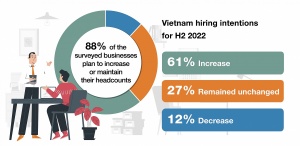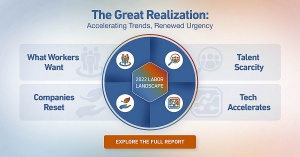Facing the biggest HR challenges in 2022
What are the biggest HR challenges that businesses are facing?
Recruitment difficulty is now the biggest challenge facing companies. There are three main reasons. First, the labour supply has decreased significantly after the pandemic as workers have changed jobs, withdrawn from the labour market, or moved from big cities to rural areas.
Second, the demand for labour skills is higher under the digital transformation while the current workforce cannot keep up with the requirements. A survey by ManpowerGroup Vietnam on 200 foreign-invested manufacturing businesses has revealed that, besides technical skills, workers often struggle to meet the requirements of other soft skills like time management, teamwork, and foreign languages.
Third, as Vietnam is becoming a more attractive investment destination, the number of new businesses in Vietnam has increased substantially in 2022, including overseas ones. This leads to greater competitiveness in the labour market.
 |
| Son Nguyen, country operations manager for Staffing and Outsourcing Services at ManpowerGroup Vietnam |
How can enterprises recruit and retain the best staff in Vietnam?
The pandemic has made people rethink what work means to them and what matters in their life. In particular, income is no longer the most important thing. People now care more about a flexible work-life balance, a good environment, health and well-being, and career development opportunities.
Companies that fail to understand and respond to these trends could risk losing talent to their competitors. About 81 per cent of global employees expect training programmes from their employers to help keep skills up to date, according to ManpowerGroup's recent report – The Great Realization. Also, nearly 25 per cent of workers are looking for employers who provide benefits like caregiving leave.
We suggest developing an internal training and succession plan to increase retention, build resilience, and prepare for changes in the market. Companies could also partner with colleges and universities to seek talent with the desired skills and knowledge.
ManpowerGroup Vietnam has been in an active partnership with colleges and universities and vocational schools nationwide to connect students with decent job opportunities. We are running our Trainee Programme 2022 with intensive on-the-job training and career orientation. We aim to land the trainees in permanent positions after one year, powering our current workforce with young talent.
Do you have any suggestions for protecting the informal workforce in Vietnam?
There are about 21.4 million informal workers out of a total workforce of 51.6 million in Vietnam, according to the General Statistics Office. Most of them do freelance, gig, or day work, and they are the vulnerable workforce. They are not engaged in work via formal employment contracts with a direct employer, and many of them don’t receive any social insurance and other entitled employee benefits as a consequence.
The majority of the local informal workers are non-skilled. There are probably many reasons why informal workers don’t obtain key benefits from formal employment contracts. For instance, some might prefer not to pay social insurance for better incomes from many sources. In some other cases, the type of jobs they are performing are temporary or seasonal work. Therefore, they fail to meet certain requirements of employers to sign a labour contract.
To increase the opportunity for the informal workforce, there is a need for concerted coordination from both parties: the government as policymakers and the employers, and there should be a mindset shift by the informal workers.
 |
| Many Vietnamese informal workers don't receive employee benefits |
In the long run, it is sustainable to gradually convert them into a formal workforce, e.g. permanent workers, or a contingent workforce like in mature markets like the US, Canada, and Germany. In the short term, employers should hold higher responsibilities for their informal workers and develop an integrated strategy for their workforce.
At ManpowerGroup Vietnam, many of our contingent workers and associates who are understaffing and outsourcing contracts with us also do seasonal or temporary jobs. However, they can benefit fully from their formal work contract and full social insurance.
Though Vietnam is not a high-income country, the minimum wage has increased in recent years. What do you make of this trend?
The income of employees or workers generally depends on their educational levels, technical skills, contributions, and roles in their organisations.
Income may also vary depending on other factors like economic trends and locations. Vietnam has seen an improvement in terms of the minimum wage of workers over the past years under the government’s efforts to improve lives.
However, the local workforce’s productivity needs to be improved to create a high-income country. Apart from educational levels and the government’s policies to create favourable conditions, one important mission is to create upskilling and reskilling opportunities for local workers.
Under speedy digital transformation worldwide and locally, the skilling initiative has become more important than ever. According to ManpowerGroup Vietnam’s latest whitepaper series The Future of Work, 83 per cent of enterprises have already increased their emphasis on employee skilling efforts over pre-pandemic times.
Has the latest regulation on foreign experts working in Vietnam impacted the foreign-invested business community?
The new Labour Code, effective as of 2021, introduced some new changes in work permit procedures for foreigners. Regulations on work permits are stricter, and the application and documentation procedures are more complicated.
There is also variation in approval processes between different provinces. However, on a positive note, approval should be granted on time as long as all documents are submitted. These new regulations aim to create favourable conditions for domestic workers, make procedures more transparent, improve the quality of the labour market, and promote procedures’ transparency.
In supporting businesses and expatriates, ManpowerGroup Vietnam, as a one-stop-shop HR solution provider, can provide comprehensive, innovative HR services, from staffing and outsourcing over permanent recruitment and payrolls to expatriate consulting services like work permits, visas, and temporary residence card applications. With our 15 years of experience in Vietnam and a team of 120+ professional consultants, we help foreign workers start their careers in Vietnam smoothly and conveniently.
 | Solving talent shortages amid fierce human capital landscape Worker shortages in various fields are creating headaches for both local and foreign-invested businesses (FIE) in Vietnam. Andree Mangels, general manager of ManpowerGroup Vietnam, shares his insights about the current demand for white and blue-collar workers in Vietnam as well as a strategy that employers should apply to attract and retain talent. |
 | Employers expect hiring to increase in H2 Employers are expecting hiring to increase in the last two quarters of the year as positive growth rates are reported in various sectors, according to the Vietnam Employment Outlook Survey Q3 and Q4/2022 announced by ManpowerGroup Vietnam on August 9. |
 | Stakeholders seek sustainable strategies to retain workers More than 200 business leaders and representatives from the Ministry of Labour, Invalids, and Social Affairs (MoLISA), Long An People’s Committee, and Long An Economic Zones Management Authority (LAEZA) gathered at a seminar on June 14 to discuss sustainable strategies for attracting and retaining workers after the pandemic. |
 | Accelerating trends and renewed urgency for labour According to ManpowerGroup’s recently released labour landscape report, this year will probably be one of the most transformative in human history. With workers taking more control of their professional lives, the rapid acceleration of digital adoption, and businesses realising they need to become more sophisticated, several labour trends have emerged that will impact organisations of every size. |
 | Latest HR trends in logistics revealed Under the impact of the pandemic and digital transformation, the workforce trends witnessed in logistics are not new, but they are recognised as urgent and accelerate daily. VIR’s Bich Thuy had the opportunity for an exclusive interview with Trang Nguyen, country head of Permanent Recruitment and Executive Search at ManpowerGroup Vietnam about the most significant human resources trends in the logistics industry. |
What the stars mean:
★ Poor ★ ★ Promising ★★★ Good ★★★★ Very good ★★★★★ Exceptional
Related Contents
Latest News
More News
- Green jobs needed as businesses embrace sustainability (April 06, 2023 | 11:24)
- HR leaders urged to handle work management in global uncertainty (October 20, 2022 | 17:07)
- Solving talent shortages amid fierce human capital landscape (August 26, 2022 | 16:18)
- Employers expect hiring to increase in H2 (August 13, 2022 | 21:30)
- Stakeholders seek sustainable strategies to retain workers (June 21, 2022 | 17:54)
- Accelerating trends and renewed urgency for labour (May 05, 2022 | 14:25)
- Latest HR trends in logistics revealed (April 28, 2022 | 14:38)
- Sustainable employment under digital transformation and the pandemic (October 29, 2021 | 15:04)
- Employment security and the future of skills for Vietnamese workers in digital transformation (October 26, 2021 | 17:20)
- Strengthening businesses’ immune system prior to economic reopening (September 29, 2021 | 13:58)

 Tag:
Tag:

























 Mobile Version
Mobile Version